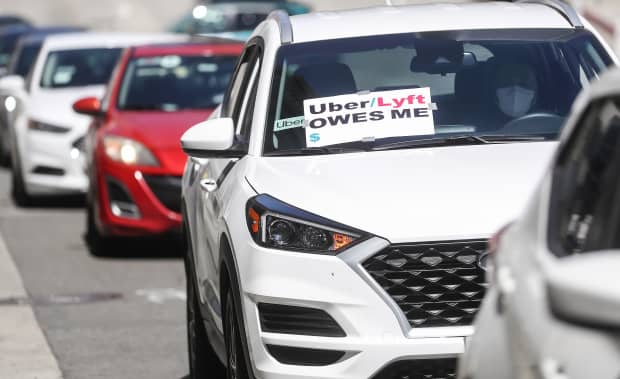This post was originally published on this site

Uber drivers in Southern California sought enforcement of the new California law in an April protest so that they may qualify for unemployment insurance amid the COVID-19 pandemic.
Getty Images
A judge ruled Monday that Uber Technologies Inc. and Lyft Inc. must classify their drivers as employees due to a new California law, a decision that threatens the business models of the ride-hailing giants and other gig-economy companies.
California Attorney General Xavier Becerra and the city attorneys of San Francisco, Los Angeles and San Diego sued the San Francisco-based companies, asking a judge for a mandatory injunction ordering the companies to comply immediately with a new state law over worker classification, which became effective Jan. 1. Uber UBER, -1.91% is challenging the constitutionality of the law, known as Assembly Bill 5 or AB5, and in a hearing last week argued against an immediate injunction pending a trial in that lawsuit. The ride-hailing giants and other gig companies have succeeded in putting an initiative on the state ballot in November that offers worker concessions but would exempt them from having to comply with the new California law.
In granting the injunction, Judge Ethan Schulman of the Superior Court in San Francisco wrote in his decision: “The People have amply demonstrated a reasonable probability of prevailing on their claim that Defendants are misclassifying their drivers.”
Driver organizer Nicole Moore of Rideshare Drivers United in Los Angeles said in an interview Monday: “This is absolutely the best-case scenario. It shows that the state of California is behind drivers.”
What comes next will be closely watched in a case with the potential for huge repercussions. Uber and Lyft LYFT, +2.84% told the judge in the injunction hearing Thursday that an injunction would be unprecedented and will affect hundreds of thousands of drivers. Schulman stayed the injunction for 10 days pending an appeal, but legal experts say the companies are likely to ask for an extension.
“I would think the companies have a big mountain to climb,” said William Gould, emeritus professor at Stanford Law School and a former chief of the National Labor Relations Board. “Their sky-will-fall arguments are more appropriately addressed to the legislature than the judiciary.”
Uber and Lyft were quick to say they intend to appeal.
“The court’s ruling is stayed for a minimum of 10 days, and we plan to file an immediate emergency appeal on behalf of California drivers,” an Uber spokesman told MarketWatch in an email.
“Drivers do not want to be employees, full stop,” a Lyft spokesman wrote. “We’ll immediately appeal this ruling and continue to fight for their independence. Ultimately, we believe this issue will be decided by California voters and that they will side with drivers.”
Uber, Lyft and other gig companies say 76,000 drivers support Prop. 22, and often tout the flexibility they offer drivers and delivery workers as a reason for not wanting to classify them as employees.
That “presents a false choice,” Gould said, maintaining that gig companies can choose to employ drivers and delivery workers as part-timers, for example. “Employees can be flexible —much of the last quarter century has been given over to making employees more flexible in deciding how and when work is done in manufacturing.”
Shares in Uber and Lyft dropped in after-hours trading Monday, showing declines of 1% to 2%.

